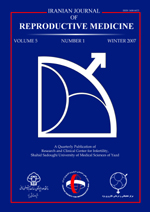
|
International Journal of Reproductive BioMedicine
Research and Clinical Center for Infertility, Shahid Sadoughi University of Medical Sciences of Yazd
ISSN: 1680-6433
EISSN: 1680-6433
Vol. 10, No. 6, 2012, pp. 523-530
|
 Bioline Code: rm12075
Bioline Code: rm12075
Full paper language: English
Document type: Research Article
Document available free of charge
|
|
|
International Journal of Reproductive BioMedicine, Vol. 10, No. 6, 2012, pp. 523-530
| en |
Evaluation of two DNA extraction methods from maternal plasma for using in non-invasive bovine fetus gender determination
Davoudi, Arash; Tarang, Alireza; Aleyasin, Seyed Ahmad; Salehi, Abdolreza; Seighalani, Ramin & Tahmoressi, Farideh
Abstract
Background: Fetal DNA in maternal plasma and serum has been shown to be a useful material for prenatal fetal sex determination during early gestational ages. Non-invasive prenatal diagnosis is now possible at 8th week of pregnancy, by maternal blood sample testing.
Objective: The purpose of this study was to evaluate two DNA extraction methods from mother plasma and its routine clinical application in bovine fetus gender determination with non-invasive method.
Materials and Methods: Maternal blood samples were taken from 40 pregnant cows during the 8th-38th weeks of gestation. DNA was extracted from 350 μl of maternal plasma with two salting-out and phenol-chloroform methods. The absorption in A260 and purity (A260/A280) of extracted DNA were detected by ultraviolet spectrophotometer. Three μl of the extracted DNA with phenol-chloroform method was used as a template. The PCR reaction was carried out to amplify the fragments of X and Y chromosomes of amelogenin, TSPY and BC1.2 genes.
Results: The difference between the mean absorption of DNA extracted by phenol-chloroform method and salting-out method was not significant in A260 (p >0.05, p=0.3549), but the difference between mean purity (A260/A280) of DNA extracted by phenol-chloroform method and salting-out method was significant (p<0.001). X chromosome fragment was detected in all 40 samples and Y chromosome fragments were detected in 25 plasma samples which were delivered a male calf. The sensitivity and specificity of test was 100% with no false negative and false positive results.
Conclusion: The results showed that phenol-chloroform method is a simple and sensitive method for isolation of fetal DNA in maternal plasma.
Keywords
DNA extraction, Maternal plasma, Bovine fetus, Gender determination, Non-invasive
|
| |
© Copyright 2012 - Iranian Journal of Reproductive Medicine
Alternative site location: http://www.ijrm.ir
|
|
